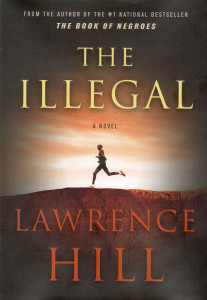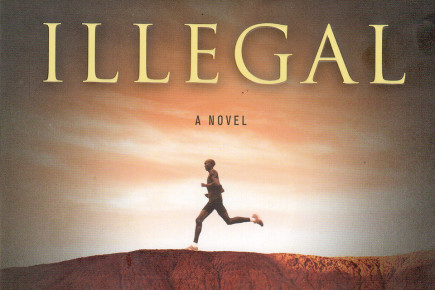Lawrence Hill, author of the captivating and critically acclaimed, The Book of Negroes, touches on topics of oppression, refugees and the quest to stay alive in a world that wants you dead, in his novel The Illegal.
Though the novel is set in the future, it is familiar as these are issues that are prevalent within our society today – just take a look at the timelines for hashtags like #BlackLivesMatter, #JusticeFor______ or #WelcomeRefugees. The novel sheds light on a topic many hear about on the news or through social media, but are still far removed from.
The Illegal follows the story of marathon runner, Keita Ali, who, in order to save his life, takes an offer he can’t refuse. The story is set in the Indian Ocean within the fictional Ortiz Sea, where two make-believe countries exist: the island of Zantoroland, one of the richest nations in the world and the island of Freedom State.
 Freedom State, was created by Zantorolanders who were enslaved by the Freedom State government for two centuries until slavery was abolished; they were later sent back to Zantoroland where they lived in poverty.
Freedom State, was created by Zantorolanders who were enslaved by the Freedom State government for two centuries until slavery was abolished; they were later sent back to Zantoroland where they lived in poverty.
Although fictional, The Illegal is reminiscent of the story of Black people, who were enslaved to help foster and build rich communities, only to later be excluded from the community they helped build – the impacts of which are felt to this day.
Zantoroland is known worldwide for its fast elite runners and Ali wants to be within that category. He spends much of his free time training and practising his breathing. For him, being a marathoner means more than just being able to run fast; it also means a way of escaping from the corrupt government of Zantoroland, whose new president, that runs on a dictatorship philosophy, has no problem killing its people and leaving their naked, dead bodies in the Fountain of Independence.
Throughout the novel Ali meets characters that live in AfricTown – a small, congested area where the “illegals” live amongst each other in shipping containers.
As a young boy Ali lost both his parents due to circumstances that involved the Zantoroland government, leaving him to care for himself and his sister. His mother, Lena, of Faloo ethnicity, suffered a heart attack while arguing with guards that came to their home. His father, Hassane Mustafa, a.k.a Yoyo, a Bamileke Cameroon African journalist, was killed by the president and left naked at the Fountain of Independence.
Then Ali’s older sister, Charity, gets acceptance into Harvard, which in the novel, though fictional, is still considered an elite school.
This all prompts Ali to speak with marathon recruiting rep, Anton Hamm, who pays for his travel expenses to get to Freedom State. While in Freedom State, Ali knows this is his one chance to stay alive and takes off on Hamm, trying his best to stay away from any officers or officials who will deport him and any other “illegals” back to their country. Throughout the novel Ali meets characters that live in AfricTown – a small, congested area where the “illegals” live amongst each other in shipping containers.
Hill has an amazing sense of creating a story. His descriptive writing helps to paint the perfect imagery.
Hill has an amazing sense of creating a story. His descriptive writing helps to paint the perfect imagery. The way he describes Ali watching runners go by the church on the dirt road captures the essence of his vivid writing capabilities:
“The runners were bunched tightly together. They all wore the same gear: running shoes, white socks, white running shorts stained with red dust, and the blue-and-red singlets reserved for the top twenty runners in the national marathon squad. The runners spilled along the road like blood out of veins, passing over yet another hill. Brown arms swung in loose unison and legs churned smoothly, feet nearly soundless on the dirt road, apart from crunching pebbles.”
The Illegal leaves readers thinking about today’s issues like police brutality towards Black people and what it’s like to be a refugee in a country full of wealth, giving what sometimes may seem to be far removed issues, a face.
Image: Scan of hard copy book cover




Comments are closed.